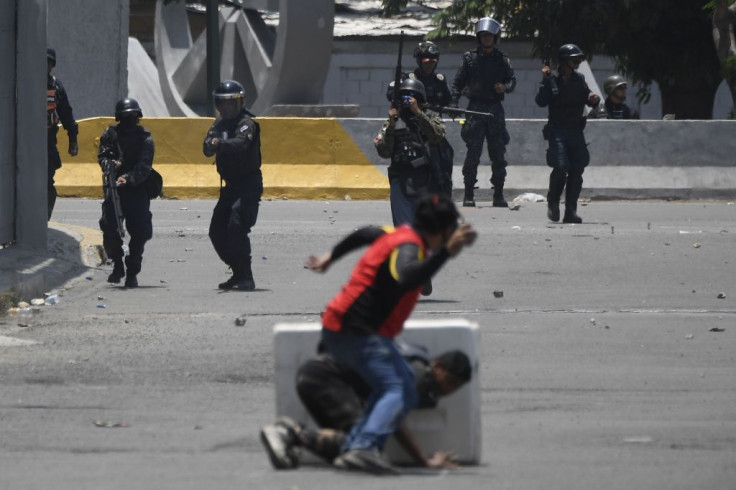Venezuela Crisis: How The United States And Russia Differ On The Conflict

Venezuela's political crisis has exposed the very different interests of the United States and Russia in the oil-rich South American country.
The U.S. has called for Venezuela President Nicholas Maduro to step down and be replaced with Juan Guido, the President of the Venezuelan National Assembly.
Russia, on the other hand, supports the embattled Maduro and maintains a close relationship with his government.
Fifty-four countries view Guaido as the legitimate president of Venezuela, including Venezuela's neighbor, Brazil.
US View
The U.S. has numerous reasons to support the exit of Maduro. He is viewed as the illegitimate leader of Venezuela and the U.S. has argued that last year's presidential elections were a sham. Vice President Mike Pence has called Maduro "a dictator with no claim to power."
The U.S. has hinted at possible military intervention to oust Maduro with Trump saying in January that "all options are on the table."
Democrats are mostly against military intervention in Venezuela. Sen. Bernie Sanders of Vermont has stated that military intervention is "off the table," while Rep. Ilhan Omar of Minnesota called a U.S.-backed coup "not a solution to the dire issues we face." Rep. Tulsi Gabbard of Hawaii tweeted that, "the United States needs to stay out of Venezuela. Let the Venezuelan people determine their future. We don't want other countries to choose our leaders – so we have to stop trying to choose theirs."
Some Republicans have also expressed reservations.
"What would our military’s mission be in Venezuela? Would the administration push for our military to conduct regime change?" said Sen. Todd Young of Indiana, while Sen. Lindsey Graham of South Carolina said "it's too early" to consider military intervention.
But 15 senators in April introduced bipartisan legislation to provide humanitarian aid and internationalize sanctions with the VERDAD act.
"As Maduro’s recalcitrant regime continues to stumble towards the total collapse of Venezuela, the United States Congress is coming together in a bipartisan manner to put teeth behind our support for the Venezuelan people as they seek to restore democracy and address a humanitarian catastrophe of unprecedented proportions in our hemisphere," said Sen. Bob Menendez, D-N.J.
"The VERDAD Act provides the Trump Administration with the necessary diplomatic tools to move beyond presidential promises towards a substantive and peaceful strategy that allows Venezuelans to protect their human rights, advance their democratic values, and end the nightmare that has been the Maduro reign of terror."
Russia View
Russia has its own economic and political interests when it comes to Venezuela after warm relations with Maduro's political successor Hugo Chavez. Moscow has sold $11.4 billion in weapons to Caracas since the mid-2000s and there were plans in 2014 for Russia to put military bases in Venezuela.
Russia's state-owned oil company Rosneft has previously lent $2.5 billion dollars to Venezuela in exchange for oil shipments. Russia and Venezuela also signed a gold investment deal.
In March 2018, Time reported that Russia helped Venezuela launch the Petro, a state-backed cryptocurrency that would help Venezuela avoid U.S. sanctions. The bank that helped finance the Petro, Moscow-based Evrofinance Mosnarbank, was sanctioned by the U.S. in March for supporting Venezuela state-owned oil giant PdVSA, which had been sanctioned by the U.S. in January.
Russian foreign minister Sergei Lavrov on Sunday called the U.S. "irresponsible" for considering a plan to oust Maduro. The Russian government has tried to argue that a U.S. military intervention in Venezuela would be catastrophic.
However, Russia would probably stop short of intervening on behalf of Maduro.
"Venezuela isn't Russia's military ally, like, say, Belarus or Kazakhstan," Ruslan Pukhov, director of the Centre for Analysis of Strategies and Technologies, told CBS News.
Bobby Ilich contributed to this report.
© Copyright IBTimes 2025. All rights reserved.




















